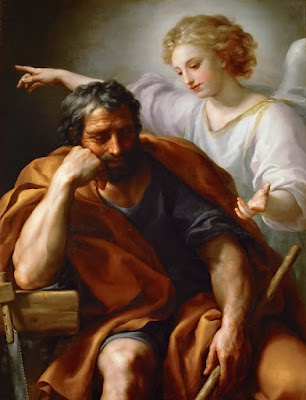JOSEPH OF NAZARETH, FATHER OF JESUS.
December 22 2019: Fourth Sunday of Advent - A
An Italian proverb says, “Any man can be a father, but it
takes a special person to be a dad.” Another proverb adds, “A fatherless boy is
no better than unburied seed.”
The incarnation of Christ was made know by the message of an
Angel, and Joseph is chosen to be instrument of that mystery.
We are the last Sunday of Advent. God’s love fills our
heart. The mystery we prepared for is about to be fulfilled. God is coming to
be one of us. The liturgy already distills that message of joy and love.
Isaiah, in the first reading gives the prophetic vision of the “Emmanuel, God with
us.” Paul, in the second reading, speaks of Jesus-Christ, the Messiah, as
descend of David. The Gospel gives narration of the annunciation of the good
news made to Joseph.
Joseph is someone who, apparently, has no voice in the Gospels,
and of whom we hear much very little. Nevertheless, his mission was not such
insignificant in the mystery we celebrate at Christmas, mystery of incarnation
and salvation.
In this fourth Sunday of Advent, we will like to center our
meditation on the person of Joseph of Nazareth, the just man. There is a
beautiful musical comedy of Christmas putting Joseph and Mary in scene, where
we hear Joseph questioning Mary. The song, titled “Song of Joseph”, goes this
way: “Once, once in every life, that someone special comes along the way. Now,
now I know were right, an angel came to me, and made my eyes to see that God
has given you to marry me.
MARY, I DON’T UNDERSTAND IT ALL: WHY GOD WOULD CHOOSE MY
NAME TO CALL?
I’M JUST A MAN, A SIMPLE MAN, A CARPENTER BUT A PART OF
GOD’S PLAN.
Doubt, doubt once filled my mind: would something that so
right be torn apart? Now, since the angel came, my eyes can clearly see that
you’re still meant for me, and God has planned our place in history.”
Actually, that is what Joseph really is, just a man, a
simple man, a carpenter called to be part of God’s plan. While the liturgy
finds its leitmotiv in the prophecy of the Emmanuel, Joseph is shown to be an
imminent and important actor of that prophecy. He is the one who will give to
Jesus the Davidic ascendance through the name’s giving.
From the simple and sleeping Joseph, we learn a lot. First,
of his righteousness. Matthew says, “since he was a righteous man, yet
unwilling to expose her to shame, decided to divorce her quietly.” How many
husbands or men would, like Joseph, be such righteous and fight for the dignity
of their women or wives?
We live in a world where adultery and infidelity in couples
have become more than common issues. Husbands and wives entertain secret life
and love stories outside their families. As long as the partner knows nothing or
feels nothing of that, things go the way they are. In this context and chain of
adultery and unfaithfulness, women are brought the pay the heaviest wage when caught.
Society and civil laws punish severely women’s infidelities; and more severely,
when this is crowned with a pregnancy, while men run thousands of women and
build parallel families. Joseph, we read, was a just man, a challenge for all
men.
The most important we learn about Joseph in this mystery of
the “Emmanuel”, is how God comes to change man’s project. We read from Matthew’s
record that Joseph and Mary had a project of life. They were to get married and
live together, build their family. “But before they lived together, she was
found with child through the Holy Spirit.” God came to make intrusion in their
dream and transform it according his own plan. That changes completely the
orientation of their life. Joseph is brought to play the role of God’s Son
stepfather.
Joseph, in this regard, stands one’s again as the epitome of
the good man, the righteous. He will play the good husband for Mary, by caring
for her: “unwilling to expose her to shame,” and a good father for Jesus, the
son to be born. He not only gave him the name dictated by the Angel, but he
also watched over him and protected him, step by step in his growth, far from
all danger (Mt 2: 13-23). There is actually nothing to question about Joseph’s
love for Mary, and nothing more about his love for the child Jesus. It is because
of that love he will flee in Egypt with him and his mother. It is also because
of that same love he would search for him with anxiety when he was lost in
Jerusalem (Luke 2:41-52). By the same love, he will teach him his trade, making
of him a carpenter (Mark 6:3).
All these sayings about Joseph, the silent, but yet powerful
man, are a challenge to our today’s men, fathers and husbands. They question us
about righteousness. How faithful are you to your commitments and promises? How
much love do you show to your wife and children and what are you able to do for
them? Will you, like Joseph, be able to give up your personal dreams and embrace
the dream or project of God for your family?
The irresponsible Fathers, let us not fail saying it, our
world today counts plenty. It is even because of that irresponsibility of parents,
mostly of fathers that many phenomena undermine our societies. It is time, in
this coming Christmas, to ask the intercession of St. Joseph for the conversion
of men and husbands to righteousness. God is coming to be with us. Like St. Joseph,
let us welcome this mystery of the Emmanuel. In all humility, let us open a window
to God’s plan in our projects of life.





Comments
Post a Comment